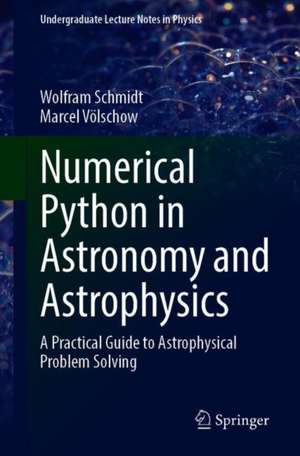Numerical Python in Astronomy and Astrophysics: A Practical Guide to Astrophysical Problem Solving: Undergraduate Lecture Notes in Physics
Autor Wolfram Schmidt, Marcel Völschowen Limba Engleză Paperback – 15 iul 2021
Din seria Undergraduate Lecture Notes in Physics
- 17%
 Preț: 362.11 lei
Preț: 362.11 lei -
 Preț: 398.45 lei
Preț: 398.45 lei -
 Preț: 265.30 lei
Preț: 265.30 lei - 15%
 Preț: 478.05 lei
Preț: 478.05 lei -
 Preț: 371.85 lei
Preț: 371.85 lei - 17%
 Preț: 364.52 lei
Preț: 364.52 lei - 15%
 Preț: 620.25 lei
Preț: 620.25 lei - 17%
 Preț: 363.03 lei
Preț: 363.03 lei - 17%
 Preț: 427.77 lei
Preț: 427.77 lei -
 Preț: 493.12 lei
Preț: 493.12 lei - 18%
 Preț: 789.98 lei
Preț: 789.98 lei -
 Preț: 385.10 lei
Preț: 385.10 lei -
 Preț: 398.12 lei
Preț: 398.12 lei -
 Preț: 401.24 lei
Preț: 401.24 lei - 13%
 Preț: 358.33 lei
Preț: 358.33 lei - 17%
 Preț: 429.08 lei
Preț: 429.08 lei - 17%
 Preț: 362.93 lei
Preț: 362.93 lei -
 Preț: 472.29 lei
Preț: 472.29 lei - 17%
 Preț: 363.47 lei
Preț: 363.47 lei -
 Preț: 338.97 lei
Preț: 338.97 lei - 17%
 Preț: 364.56 lei
Preț: 364.56 lei - 20%
 Preț: 579.76 lei
Preț: 579.76 lei - 17%
 Preț: 365.68 lei
Preț: 365.68 lei - 17%
 Preț: 366.61 lei
Preț: 366.61 lei - 17%
 Preț: 432.41 lei
Preț: 432.41 lei -
 Preț: 372.36 lei
Preț: 372.36 lei -
 Preț: 359.53 lei
Preț: 359.53 lei -
 Preț: 317.55 lei
Preț: 317.55 lei -
 Preț: 229.57 lei
Preț: 229.57 lei - 15%
 Preț: 538.28 lei
Preț: 538.28 lei -
 Preț: 468.02 lei
Preț: 468.02 lei -
 Preț: 428.07 lei
Preț: 428.07 lei -
 Preț: 637.07 lei
Preț: 637.07 lei -
 Preț: 582.65 lei
Preț: 582.65 lei -
 Preț: 424.77 lei
Preț: 424.77 lei -
 Preț: 446.96 lei
Preț: 446.96 lei - 15%
 Preț: 515.30 lei
Preț: 515.30 lei -
 Preț: 348.22 lei
Preț: 348.22 lei -
 Preț: 313.45 lei
Preț: 313.45 lei -
 Preț: 319.43 lei
Preț: 319.43 lei - 15%
 Preț: 509.58 lei
Preț: 509.58 lei - 15%
 Preț: 507.95 lei
Preț: 507.95 lei -
 Preț: 361.29 lei
Preț: 361.29 lei -
 Preț: 453.21 lei
Preț: 453.21 lei -
 Preț: 453.01 lei
Preț: 453.01 lei - 15%
 Preț: 722.67 lei
Preț: 722.67 lei -
 Preț: 392.21 lei
Preț: 392.21 lei -
 Preț: 383.71 lei
Preț: 383.71 lei
Preț: 397.25 lei
Nou
Puncte Express: 596
Preț estimativ în valută:
76.01€ • 79.36$ • 62.91£
76.01€ • 79.36$ • 62.91£
Carte disponibilă
Livrare economică 14-28 martie
Livrare express 27 februarie-05 martie pentru 31.57 lei
Preluare comenzi: 021 569.72.76
Specificații
ISBN-13: 9783030703462
ISBN-10: 3030703460
Pagini: 250
Ilustrații: X, 250 p. 55 illus., 50 illus. in color.
Dimensiuni: 155 x 235 x 18 mm
Greutate: 0.37 kg
Ediția:1st ed. 2021
Editura: Springer International Publishing
Colecția Springer
Seria Undergraduate Lecture Notes in Physics
Locul publicării:Cham, Switzerland
ISBN-10: 3030703460
Pagini: 250
Ilustrații: X, 250 p. 55 illus., 50 illus. in color.
Dimensiuni: 155 x 235 x 18 mm
Greutate: 0.37 kg
Ediția:1st ed. 2021
Editura: Springer International Publishing
Colecția Springer
Seria Undergraduate Lecture Notes in Physics
Locul publicării:Cham, Switzerland
Cuprins
Chapter 1. Introduction.- Chapter 2. Getting Started with Python.- Chapter 3. Computing and Displaying Data.- Chapter 4. Functions and Numerical Methods.- Chapter 5. Solving Differential Equations.- Chapter 6. Astronomical Data Analysis.
Notă biografică
Wolfram Schmidt is Head of IT and senior researcher at the Hamburg Observatory. He holds a Dipl.-Ing. in Physics and an M.Phil. in Astrophysics and received his Dr. rer. nat. from the Technical University of Munich and the Max Planck Institute for Astrophysics, Garching. He completed his Habilitation with a thesis on the numerical modeling of astrophysical turbulence. Dr. Schmidt has worked on numerical simulations of a variety of astrophysical systems, ranging from thermonuclear supernovae through star-forming clouds to cosmological structure formation. Currently he is conducting research projects in the areas of computational cosmology and magnetohydrodynamic turbulence with international collaborators. In addition to his research activities, he teaches high-performance computing at Hamburg University and acts as a consultant to the Northern Supercomputing Alliance (HLRN).
Marcel Völschow is a research associate at Hamburg University. He holds BSc and MSc degrees in Physics and the subject of his doctorate is magnetic processes in binary stars. While being rooted in theoretical astrophysics, his research also covers the processing and analysis of large survey data sets. Whether working in public outreach, high school labs, or academic teaching, he has always been motivated by enthusiasm for the beauty of the universe. He is the author of a number of articles in peer-reviewed journals.
Textul de pe ultima copertă
This book provides a solid foundation in the Python programming language, numerical methods, and data analysis, all embedded within the context of astronomy and astrophysics. It not only enables students to learn programming with the aid of examples from these fields but also provides ample motivation for engagement in independent research. The book opens by outlining the importance of computational methods and programming algorithms in contemporary astronomical and astrophysical research, showing why programming in Python is a good choice for beginners. The performance of basic calculations with Python is then explained with reference to, for example, Kepler’s laws of planetary motion and gravitational and tidal forces. Here, essential background knowledge is provided as necessary. Subsequent chapters are designed to teach the reader to define and use important functions in Python and to utilize numerical methods to solve differential equations and landmark dynamical problems in astrophysics. Finally, the analysis of astronomical data is discussed, with various hands-on examples as well as guidance on astronomical image analysis and applications of artificial neural networks.
Caracteristici
Teaches programming in Python with the aid of examples from astronomy and astrophysics Offers an accessible approach to numerical techniques and methods of data analysis used by astrophysicists Promotes a research-oriented approach
